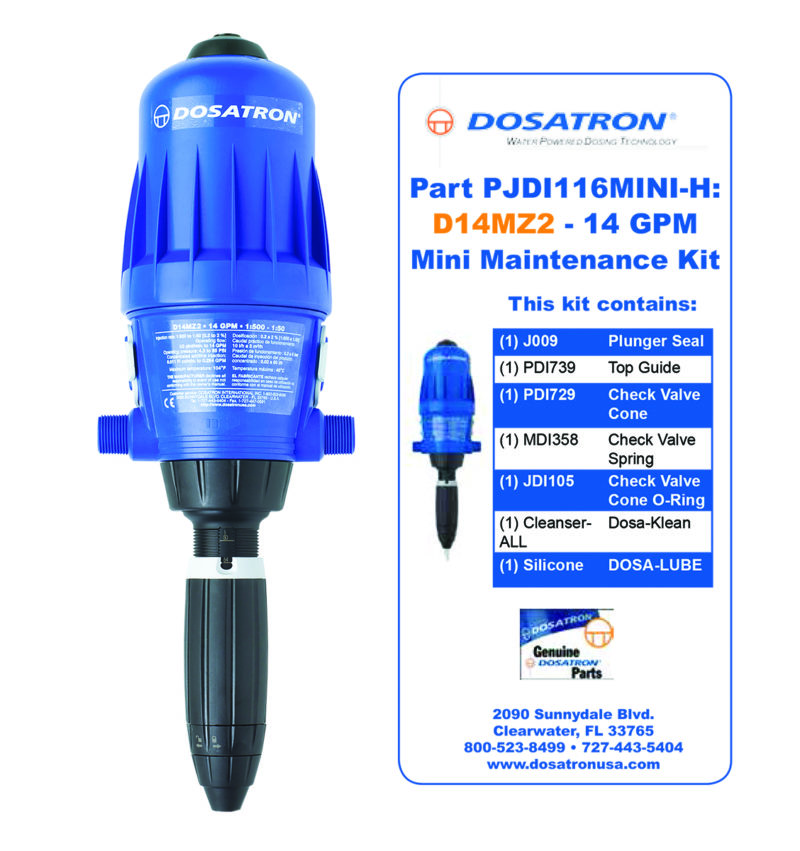Quick Steps to Fertilizer Injector Maintenance
Fertilizer injectors need maintenance. When you perform regular maintenance, and cleaning, it pays off in higher quality plant material.
So what keeps growers from regularly checking their fertilizer injector to see if it is accurate and working properly?
Over the years, I have visited thousands of growers. One of my first questions is always, “When was the last time you replaced the maintenance kits on your injectors?”
Here are some of the answers I hear repeatedly:
• Don’t remember
• Not sure
• A few years ago?
• Never?
• If it is working, I don’t touch it (true statement)
My next question is, “How do you know you are injecting the right amount of fertilizer, or pesticides?”
You cannot tell if your injector is working properly by the color of the fertilizer water. Every fertilizer manufacturer uses different amounts of dyes, and with most growers injecting fertilizer on a constant feed, it is impossible to tell. It is just not an accurate way to know!

WHY IS ACCURACY IMPORTANT?
If you have determined that you want to feed your plant material at 100 ppm on a constant feed, your injector might only be putting out 50 ppm. Let’s say you use this same injector for applying a pesticide. Unless your fertilizer injector is calibrated, you will not apply the correct amount. The quality of your plant material will suffer. Many growers use their injectors to apply a plant growth regulator; your results will be off if your injector is not calibrated.
STEP-BY-STEP INJECTOR MAINTENANCE
Contact your injector manufacturer, or go to their website for information on what they recommend you do, to keep your equipment running properly.
Use a calibrated EC meter, so that you know how much fertilizer you are injecting. It is recommended this be done weekly. Be sure to check that your stock solution was made up correctly!
Set up a schedule to do your maintenance at a given time of the year. This ensures all your injectors get attention. It is best to clean your injectors before replacing all wear parts.
A FEW MORE TIPS
Always inspect your equipment for worn parts, like the suction tube. Sun and chemicals will wear parts, and should be replaced.
If you find your injector is starting to wear out, plan to replace it — instead of putting expensive parts in old equipment.
Be sure you have invested in water filters. These will help prevent premature wear, not only on your injectors, but all your irrigation equipment.
Injector maintenance is not expensive, and truly increases profits. Taking care of your investments makes good business sense. After all, would you not change the oil in your truck?
SIDEBAR:
Important Information on the Use of EC Meters
EC (electrical conductivity) meters read the amount of fertilizer salts injected by your fertilizer injector. They are an easy, and accurate way to test your injector to be sure it is working perfectly. If your EC meter is calibrated, and taken good care of, it will be an inexpensive tool to help you grow the highest quality plant material.
TIPS ON USING EC METERS
• Be sure your meter is calibrated, with calibration solution that is not out of date.
• Find a meter that is easy to calibrate (you will be sure to use it, if it is not too difficult to use).
• Keep your meter prongs clean with distilled, or clear, water. After use, rinse and replace the cap to protect the prongs.
• EC meters are stored ‘dry,’ unlike pH meters where the bulbs must be stored in storage solution.
• Store EC meters in a cool dark area — never on the dashboard of the truck, the bench of the greenhouse, or let them freeze.
• It is advisable to check your EC weekly.
• Your EC readings can be off if your stock solution was not made up carefully.
• When purchasing an EC meter, look for waterproof models and good quality.


 Video Library
Video Library 




















